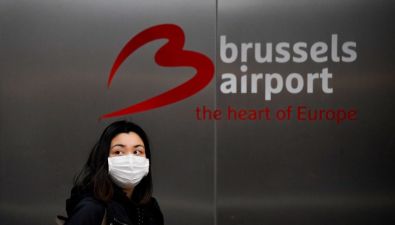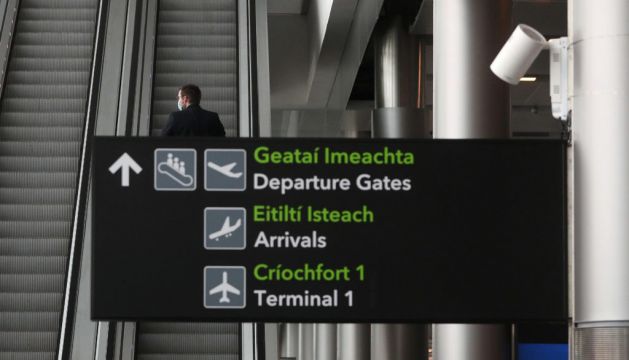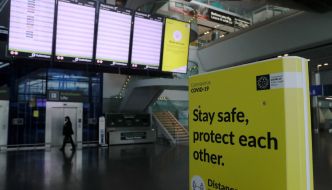A further 4,620 new cases of Covid-19 have been confirmed in the Republic amid global fears over a new variant of the virus discovered in southern Africa.
The B.1.1.529 variant, which scientists think may be more transmissible than the dominant Delta variant, was initially detected in South Africa’s most populous province of Gauteng.
One case has been found in Belgium, detected in an unvaccinated woman who arrived from Egypt on November 11th.
European Union states have agreed to temporarily suspend travel to southern Africa after the discovery of the new variant.
A committee of health experts from all 27 EU states "agreed on the need to activate the emergency break and impose temporary restriction on all travel into EU from southern Africa," the Slovenian presidency of the EU said on Twitter.
It comes as the Tánaiste has vowed to act quickly in response to the variant. Leo Varadkar said senior ministers are meeting on Friday to discuss the new variant, which has been identified in places including South Africa, Botswana, Hong Kong and Israel.
Ministers are examining additional restrictions such as visas, mandatory home quarantine, providing a negative PCR test or proof of vaccination.
Minister for Foreign Affairs Simon Coveney, Minister for Health Stephen Donnelly and Minister for Transport Eamon Ryan met on Friday afternoon to assess available options.
“We don’t know very much about this variant yet,” Mr Varadkar said. “We don’t know yet if it’s going to be a variant of concern.
“I think it is fair to say that given our experience with the Delta variant that originated in India, I think governments in the UK and Europe were slow to act on that, and I want to make sure that we are not slow to act on this occasion so we are going to act quickly.
“We expect them to make an announcement on travel restrictions later in the day.
“The legislation has lapsed for mandatory hotel quarantine. So if we introduced that we’ll need to legislate next week to do so,” Mr Varadkar added.
Fresh restrictions
Minister for Finance Paschal Donohoe said the emergence of the new Covid-19 variant may prompt decisions on fresh restrictions in the country.
He also said the Government would be making a decision “imminently” on whether to impose travel restrictions in response to the emergence of the variant in southern Africa.
Asked if hotel quarantine arrangements may be reintroduced in the country, Mr Donohoe told RTÉ radio: “If it is needed I believe it will be of a very different scope and scale to where we were the last time it was in place.”
He said he did anticipate Ireland would need to make changes in respect of quarantine but he expressed hope it would only cover a limited number of countries.
On the prospect of fresh restrictions in Ireland, Mr Donohoe said: “I think given what has happened with this variant, there certainly will be, as we move into next Tuesday [Cabinet meeting], the possibility of needing to take further decisions.”
He said he would not speculate on what decisions may be taken.
“When the Government makes decisions we need to be clear on what we are doing and communicate with clarity, which is what we do our best to do,” he said.
Mr Donohoe said while there was evidence of case numbers stabilising in Ireland, the high level of community transmission meant the country was not best placed to deal with the arrival of a new variant.
Booster jabs
Meanwhile, the Government has announced that the vaccine booster programme is to be extended to cover all those aged 16 and above.
The recommendations from the National Immunisation Advisory Committee (Niac) were accepted by Mr Donnelly and endorsed by chief medical officer Dr Tony Holohan.
In a letter to the Government, the National Public Health Emergency Team (Nphet) recommended that children’s play dates and social gatherings should be avoided for two weeks.
It also recommended extending the Covid pass to other sectors where there is a high risk of transmission.
Mr Varadkar said there has been a “very sharp increase” in infections among children under 11 in the last couple of weeks.
He said any decisions taken by Cabinet relating to children will be advisory and not statutory.
He added: “It is parents to make their own decisions in relation to how they raise their families but the advice from Nphet and Government is that we believe that when it comes to children aged between five and 11, because they’re not vaccinated, they are now at high risk of getting this virus.

“We are advising children in that age group to reduce their number of social interactions.
“School is fine. Home is fine. But I think other forms of mixing probably isn’t a good idea at this moment in time.”
He said that it is the “hope” of the Government to keep the hospitality sector and the event sector open across winter, including the Christmas period.
“That will all depend on what happens with cases and situation in the hospitals over the next week or two,” he added. – Additional reporting: PA/Reuters







